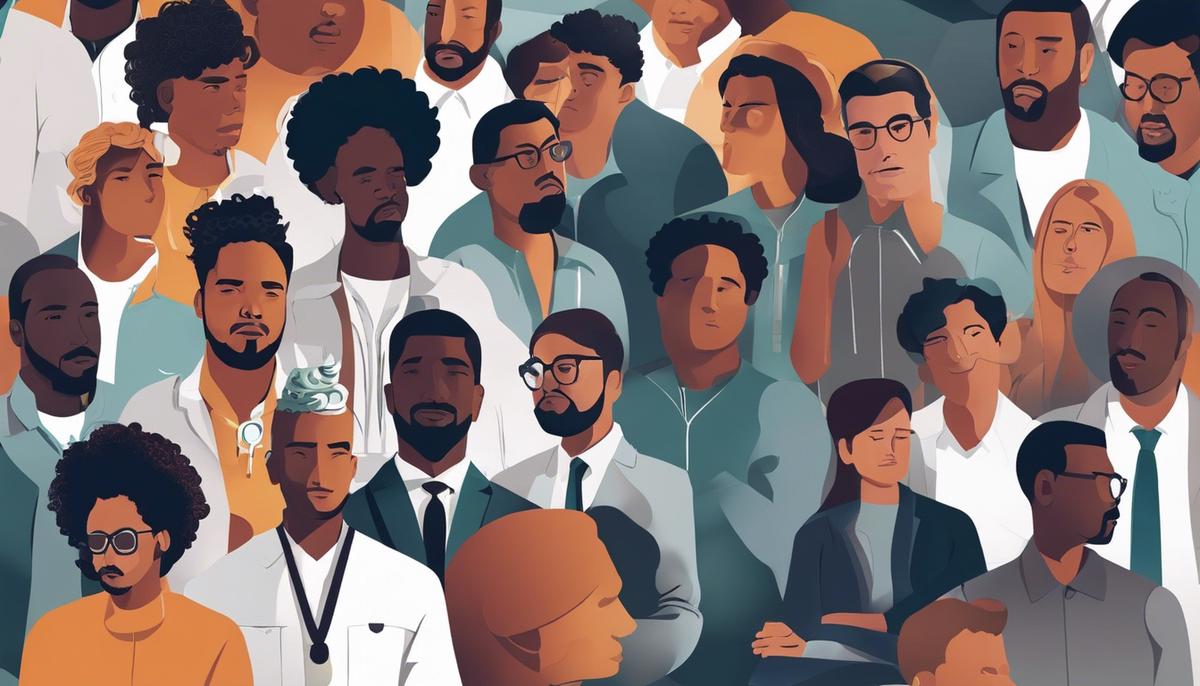Addressing mental health is vital for everyone, yet men often face a distinct set of challenges and stigmas that can prevent them from seeking the help they need. With the rise of digital technologies, there are increasing opportunities to support men’s mental health in innovative and accessible ways. This essay dives into the nuanced world of men’s mental health, presenting an in-depth analysis of its prevalence and the unique barriers men encounter. As we explore how digital interventions are reshaping the landscape of support and treatment, we will also critically evaluate a selection of top online resources tailored to address the psychological wellbeing of men across the globe.
Prevalence and Unique Challenges in Men’s Mental Health
Empirical Data and the Prevalence of Mental Health Issues Among Men
The subject of mental health among men embodies a complex and critical aspect of public health. The rigorous study and ongoing research into this area have illuminated concerning trends. Fueled by robust empirical data, the prevalence of mental health issues among men warrants detailed consideration due to its underreported nature and potential societal implications.
Quantitative studies serve as the foundation for our understanding of mental health prevalence. These empirical endeavors often utilize tools such as surveys, clinical interviews, and epidemiological calculations to gather data. For instance, the National Institute of Mental Health (NIMH) has reported that approximately 6% of men in the United States experience depression each year. Yet, this figure may only be the tip of the iceberg, as male mental health conditions are frequently underdiagnosed.
Anxiety disorders also manifest significantly in the male population, with generalized anxiety disorder (GAD), panic disorder, and social anxiety disorder being noteworthy contributors. It is estimated that 11.1% of men will experience an anxiety disorder at some point in their lives.
Substance use disorders exhibit a pronounced prevalence among men. According to empirical data, men are nearly three times more likely to be diagnosed with a substance use disorder than women. Alcohol dependence, in particular, emerges as a formidable issue—research indicates that men are nearly twice as likely to engage in heavy drinking compared to women.
Additionally, the silent crisis of male suicidality cannot be overlooked. The Centers for Disease Control and Prevention (CDC) have illuminated that the suicide rate amongst men is approximately four times higher than that of women. This stark statistic delineates the deep and often unspoken struggles that afflict the male psyche.
The empirical landscape also reveals the influence of age. For instance, young men exhibit elevated rates of impulse-control disorders and antisocial behavior, while middle-aged men demonstrate a higher susceptibility to mood disorders like depression.
Schizophrenia and other psychotic disorders also present more frequently in men, with onset typically occurring in late adolescence to early adulthood. Moreover, men often experience more severe symptoms and a less favorable course of illness compared to women.
Contributors to the widespread nature of such mental health issues in men are multifaceted. Societal expectations and traditional gender roles suggest that men often underreport symptoms or forgo seeking help. Additionally, a dearth of male-targeted mental health interventions perpetuates the gender disparity in mental health services utilization.
Despite the sobering portrait painted by these statistics, they serve an invaluable role in shaping mental health policies, informing intervention strategies, and guiding clinical practice. Recognizing and addressing the nuanced and often underrecognized realm of male mental health issues poses a significant challenge requiring dedicated research and community-level action.
The empirical data on men’s mental health issues is an irrefutable testament to a pressing public health concern that demands attention and comprehensive understanding. It is in the illumination of these statistics that researchers and healthcare providers may focus their efforts to develop more effective, gender-specific support and treatment, ultimately fostering a more equitable landscape for mental well-being.

Digital Interventions for Men’s Mental Health
In an era where technology permeates every facet of our lives, digital platforms have emerged as a pivotal tool in revolutionizing the accessibility of mental health resources, particularly for men. This transformation is significant given the historical context of mental health service utilization by the male population, which has been characteristically low due to various barriers—both social and systemic.
The advent of digital platforms, including mobile applications, telehealth services, and online support communities, has substantially improved the landscape of mental health resources in several key ways. Firstly, anonymity is a feature of these platforms that cannot be understated. Men, who often face societal pressure to adhere to stoic stereotypes, may find solace in the confidentiality that digital services afford, permitting them to seek help without fear of stigma or judgement.
Furthermore, convenience plays an instrumental role in the elevated accessibility provided by digital platforms. The traditional model of therapy or psychiatric care often entails a considerable time investment, potentially acting as a deterrent for many men. Digital platforms, by contrast, offer more flexible options that can fit within the diverse lifestyles and schedules of men, thus encouraging engagement with mental health services.
The tailored approach facilitated by digital tools has also contributed heavily to their effectiveness. Many platforms now incorporate algorithms and artificial intelligence to provide personalized care plans, self-help guides, and even direct interactions with mental health professionals through video calls or messaging. These personalized interventions can target specific issues prevalent among men, thus increasing the likelihood of a positive outcome.
Moreover, the sheer diversity of resources available through digital venues has enabled men to explore various forms of assistance, ranging from clinical treatment to peer support and everything in between. Online communities, for example, have been instrumental in providing a space for men to share experiences and receive support from others facing similar challenges, cultivating a sense of solidarity and understanding.
The educational component of digital platforms has also made strides in destigmatizing mental health issues among men. Access to evidence-based articles, expert-led workshops, and interactive modules allow men to gain insights into their conditions and the conditions of others, fostering a community that is better informed and more open to discussing mental health.
Collectively, these advancements represent a burgeoning shift toward a more accessible and accepting environment for men’s mental health care—a notable progression from restrictive past practices. Digital platforms, through their wide-reaching capabilities, stand at the forefront of this transformation, providing keys to unlock the doors of the support systems that have long been less available to men. As the digital landscape continues to evolve, there remains an optimistic outlook for more sophisticated, tailored, and impactful resources for men seeking mental health support.

Assessment and Analysis of Top Online Men’s Mental Health Resources
Moving forward, attention must be given to the digital domains that offer superior content and services with respect to men’s mental health. These resources are evaluated based on a plethora of rigorous criteria, including credibility of information, the accreditation of professionals involved, user confidentiality, the diversity of services provided, and ongoing support structures.
High-quality online mental health resources for men are distinguished by their employment of evidence-based approaches. These resources often cite scholarly articles or collaborate with certified mental health professionals to provide accurate and up-to-date information. Furthermore, platforms excelling in these services typically maintain affiliations with reputable institutions or healthcare organizations. To illustrate, the Men’s Health Forum and HeadsUpGuys are exemplary in this regard, offering resources vetted by experienced clinicians and academics specializing in male psychology and well-being.
Another crucial aspect of quality in online resources is user privacy. Men seeking help through digital platforms significantly value anonymity, especially considering the stigma still attached to men’s mental health. Some websites and apps are explicitly designed to protect user data, only collecting the minimal information necessary to offer personalized care, guidance, or recommendations. Subsequently, platforms such as BetterHelp and Talkspace provide confidential counseling services to ensure privacy.
Peer support is yet another dimension that reflects the integrity of online mental health resources. Websites and forums that create a sense of community amongst men can directly contribute to their effective healing and coping processes. The ability of these resources to facilitate connections and shared experiences can dramatically reduce the sense of isolation men might feel. Moreover, platforms which promote interactive user engagement, such as The Mighty or MaleSurvivor, have cultivated invaluable networks for shared understanding and support.
Educational content is a key determinant in the assessment of these online resources. Websites that offer comprehensive, reader-friendly information aid in dispelling myths and countering misinformation regarding men’s mental health. By providing educational tools, these platforms serve a critical function in reframing the discourse surrounding male-specific mental health issues. Notably, the National Institute of Mental Health (NIMH) offers a wealth of educational material that encourages men to acknowledge and address their psychological hardships.
Evaluating the above criteria, it is possible to discern which online resources manifest the highest fidelity and efficacy. It is crucial that men have access to these robust platforms to overcome barriers to care and embrace their journey toward better mental health. Resources such as Men’s Health Forum, HeadsUpGuys, BetterHelp, Talkspace, The Mighty, MaleSurvivor, and the NIMH demonstrate a commitment to the standards necessary for achieving excellence in providing men’s mental health support online. The continuous innovation and improvement of digital platforms foretell a more supportive and enlightened future for the mental health of men.

Men’s Mental Health Advocation and Community Outreach Online
While previous discussions have highlighted various dimensions of men’s mental health and the burgeoning potential of digital platforms to address these concerns, the crux of the matter remains: how do these online platforms engender a much-needed paradigm shift in community engagement and advocacy for men’s mental health?
A fundamental aspect of these virtual environments is their capacity to bridge geographical and social distances, fostering an interconnectedness that traditional support structures may lack. In the realm of mental health, this translates into the cultivation of global support networks that transcend boundaries and create a mosaic of shared narratives and solutions. Digital forums, social media groups, and dedicated mental health platforms have emerged as critical locales for men seeking to break the silence that often shrouds their mental health struggles.
The role of these online platforms in facilitating community engagement extends to normalizing open discussions about mental health. Here, dialogue is not merely an exchange of words but a lifeline that can guide individuals toward healing and recovery. The collective voice found in these virtual communities underscores a significant shift in how mental health is perceived – as a shared human experience rather than a solitary battle.
Moreover, advocacy for men’s mental health is amplified through the educative power of these digital platforms. By disseminating research findings, expert commentaries, and personal testimonies, online resources illuminate the nuances of mental health challenges specific to men. They serve as gateways to understanding and catalysts for change, informing policy proposals, evidence-based interventions, and societal attitudes toward men’s mental health.
In harnessing the capacities of modern technology, these platforms integrate interactive tools and resources that provide not just information but also practical strategies for coping and resilience. The spectrum of available aids—ranging from cognitive behavioral therapy apps to crisis helpline chats—illustrates the online domain’s diversity in serving men’s varied mental health needs.
In conclusion, the landscape of men’s mental health care is experiencing an undeniable transformation driven by the capabilities of online platforms. As virtual communities burgeon and the stigma around men’s mental health diminishes, the efforts to ensure that these resources remain evidence-based, user-focused, and innovative must be unrelenting. The commitment to enhancing the effectiveness and reach of online mental health resources is pivotal for the enduring betterment of men’s psychological well-being. This dedication to progress will continue to unlock unprecedented avenues for advocacy and engagement in the quest to support men’s mental health.

The digital realm has opened a new frontier for men’s mental health, offering platforms that resonate with and address the specificities of male psychological well-being. By shining a light on these resources, our intention is not only to guide men toward avenues of support but also to contribute to a broader cultural shift towards recognizing and alleviating the mental health struggles prevalent among men. It is through community outreach, well-informed advocacy online, and the steadfast commitment of individuals to break down barriers, that men can find solidarity in their journeys towards improved mental health.

One thought on “Essential Online Men’s Mental Health Guides”